中考英语时态全解之一般过去时(附中考真题点拨习题以及答案)
(完整版)初中一般过去时详细讲解与练习
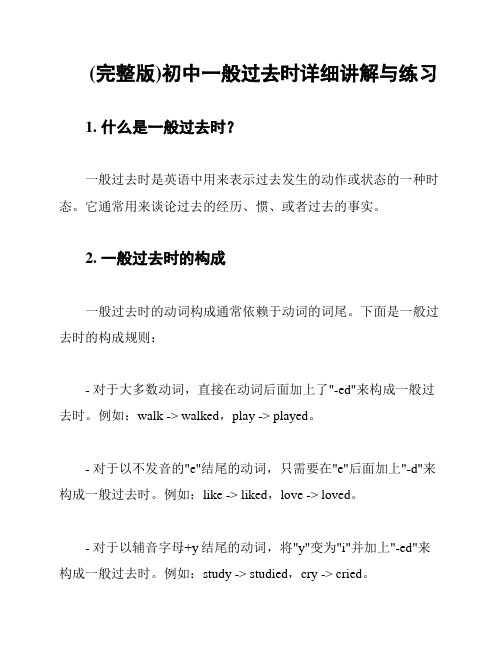
(完整版)初中一般过去时详细讲解与练习1. 什么是一般过去时?一般过去时是英语中用来表示过去发生的动作或状态的一种时态。
它通常用来谈论过去的经历、惯、或者过去的事实。
2. 一般过去时的构成一般过去时的动词构成通常依赖于动词的词尾。
下面是一般过去时的构成规则:- 对于大多数动词,直接在动词后面加上了"-ed"来构成一般过去时。
例如:walk -> walked,play -> played。
- 对于以不发音的"e"结尾的动词,只需要在"e"后面加上"-d"来构成一般过去时。
例如:like -> liked,love -> loved。
- 对于以辅音字母+y结尾的动词,将"y"变为"i"并加上"-ed"来构成一般过去时。
例如:study -> studied,cry -> cried。
- 部分动词的一般过去时需要进行不规则变化。
例如:go -> went,eat -> ate。
3. 一般过去时的用法一般过去时通常用来描述以下情况:- 过去发生的动作:I walked to school yesterday.- 过去的经历:He lived in London for five years.- 过去的事实:She was a teacher in the past.4. 一般过去时的句型练下面是一些练,帮助加深对一般过去时的理解和运用:1. 请用一般过去时填空:Yesterday, I ________ (watch) a movie at home.2. 完成句子:He _____ (visit) his grandparents last summer.3. 改写句子,使用一般过去时:I read a book yesterday. (改为否定句)4. 改写句子,使用一般过去时:They played basketball in the park. (改为疑问句)5. 总结一般过去时是用来表示过去发生的动作或状态的一种时态。
突破初中语法:一般过去时(附中考真题及解析)

一般过去时01一般过去时的概念一般过去时用来表示过去某一时间内发生的动作或存在的状态以及过去习惯性、反复性的动作。
谓语动词要用动词的过去式,常和表示过去的时间状语连用,如y e s t e r d a y昨天、l a s t n i g h t昨晚、l a s t w e e k上周、l a s t y e a r去年、…a g o等。
02一般过去时结构⒈Be 动词的一般过去时在没有实义动词的句子中使用be 动词am is 的过去式为was,are 的过去式为were,was 是表示单数,were 是表示复数。
肯定句式:主语+be(was,were)其它否定句式:主语+be(was,were)+not其它一般疑问句:Be(was,were)主语+其它?⒉实义动词的一般过去时态肯定句要使用动词的过去式,否定句和疑问句要使用助动词did.肯定句式:主语+动词(过去式)+其它否定句式:主语+didn't+动词(原形)+其它(did not=didn't)一般疑问句:Did+主语+动词(原形)+其它(do,does的过去时均为did)注:did 和didn't 是构成一般过去时的助动词,其特点是要在其后跟动词的原形。
03 规则动词的过去式⒈一般情况下,在动词原形后面加-ed如:looked,played,started,visited,stayed⒉以不发音e结尾的动词,在词尾直接加-d如:lived,closed,liked,loved,tasted⒊以“辅音字母+y”结尾的动词,先将y改为i再加-ed如:study→studied,try→tried,cry-→cried,copy→copied,carry-→carried⒋以重读闭音节(即辅音+元音+辅音)或r音节结尾,未尾只有一个辅音字母的动词,要先双写这个辅音字母后,再加-ed如:stop→stopped,plan→planned04不规则动词的过去式一、AAA型(原形→原形→原形)二、ABA型(原形→过去式→原形)三、ABC型1. ow →ew →own2. i→a →u3. 原形→过去式→过去式+(e)n4. 原形→过去式→原形+(e)n5. 无规律四、ABB型1. 原形→ought →ought2. 原形→aught →aught3. 变其中一个元音字母4. 原形→□t→□t5. 变其中一个辅音字母6.辅音字母和元音字母都变五、AAB型六、有两种形式七、情态动词05 一般过去时的用法⒈表示过去某个特定时间发生的动作或存在的状态常有明确的时间状语,如yesterday,last night,some years ago,in 1890 等,以及由when 等引导的时间状语从句。
英语一般过去时中考真题 含答案解析
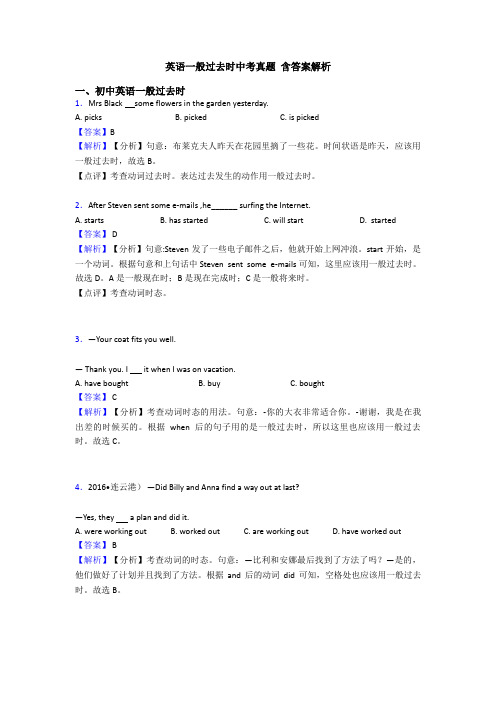
英语一般过去时中考真题含答案解析一、初中英语一般过去时1.Mrs Black some flowers in the garden yesterday.A. picksB. pickedC. is picked【答案】B【解析】【分析】句意:布莱克夫人昨天在花园里摘了一些花。
时间状语是昨天,应该用一般过去时,故选B。
【点评】考查动词过去时。
表达过去发生的动作用一般过去时。
2.After Steven sent some e-mails ,he______ surfing the Internet.A. startsB. has startedC. will startD. started【答案】 D【解析】【分析】句意:Steven发了一些电子邮件之后,他就开始上网冲浪。
start开始,是一个动词。
根据句意和上句话中Steven sent some e-mails可知,这里应该用一般过去时。
故选D。
A是一般现在时;B是现在完成时;C是一般将来时。
【点评】考查动词时态。
3.—Your coat fits you well.— Thank you. I it when I was on vacation.A. have boughtB. buyC. bought【答案】 C【解析】【分析】考查动词时态的用法。
句意:-你的大衣非常适合你。
-谢谢,我是在我出差的时候买的。
根据when后的句子用的是一般过去时,所以这里也应该用一般过去时。
故选C。
4.2016•连云港)—Did Billy and Anna find a way out at last?—Yes, they a plan and did it.A. were working outB. worked outC. are working outD. have worked out【答案】 B【解析】【分析】考查动词的时态。
句意:—比利和安娜最后找到了方法了吗?—是的,他们做好了计划并且找到了方法。
中考中考英语专题--动词的时态一般过去时(带答案)

中考中考英语专题--动词的时态一般过去时(带答案)专题九 动词时态 第二讲 一般过去时【考点归纳】【考点1】一般过去时的标志 一般过去时常用时间状语如:I went to school at 7:00 yesterday morning. She was not at home last night.例题1:(山东泰安)---Have you ever climbed Mount Tai, Carol ? ---Yes, I ______ in Taian for a week last year and reached the top of it twice. A. had stayed B. stay C. stayedD. have stayed 例题2:(上海)Last week Vivian _____a dress for her mother with her first salary. A. buyB. boughtC. will buyD. would buy例题3:(北京)---Where did you go last weekend? ---I to the Great Wall. A. go B. wentC. will goD. have gone 答案:CBB【考点2】一般过去时的用法例题1:(湖北鄂州)--- I remember there _____ a lot of fish in Yanglan Lake. Now it has been polluted.---What a pity! I think we should play a role in protecting the environment.A. are used to haveB. are used to beC. used to haveD. used to be例题2:(江苏无锡)My mind wasn’t on what he was saying so I’m afraid I ____ half of it. A. missed B. was missing C. will miss D. would miss例题3:(河南)---There is someone knocking at the door.---It must be the computer repairman. I _____him to come to fix my computer.A. callB. have calledC. calledD. will call答案:DAC【考点3】一般过去时之be动词1. be动词的过去式形式 (表示过去存在的状态)2. be动词的句式变换例题1:---Where were you last night?---I _____ in the Capital museum.A. amB. will beC. wasD. have been答案:C【考点4】一般过去时之实义动词1. 实义动词的过去式形式规则动词的过去式不规则变化动词的过去式2. 实义动词的句式变换例题1:Hello! I’m very glad to see you. When ______ you_____ here?A. did; arriveB. will; arriveC. have; arrivedD. are; arriving 例题2:(辽宁丹东)---I have ever seen Alice in Wonderland II (爱丽丝梦游仙境II).---When ______ ?---Two weeks ago.A. did you see itB. have you seen itC. do you see itD. will you see it 例题3:(宁夏)---You can’t smoke here.---Sorry, I______ the sign.A. don’t seeB. didn’t seeC. haven’t seenD. won’t see例题4:(山东菏泽)---Oh no, I can’t find my mobile phone.---Well, where _____ you last put it ?A. haveB. doC. did例题5:(四川绵阳)---Don’t see the sign“ No Parking!” on the right?---Sorry, I _____. But now I know parking here is not right.A. don’tB. didn’tC. hadn’tD. doesn’t答案:AABCB【考点5】一般过去时的易错点]He put on his coat and例题1:(江苏连云港)---Did Billy and Anna find a way out at last ?---Yes, they _____ a plan and did it.A. were working outB. worked outC. are working outD. have worked out 例题2:(湖南长沙)---Your coat fits you well.---Thank you. I _______ it when I was on a vacation.A. have boughtB. buyC. bought例题3:改错1).Did Li Ming studied E nglish this morning?2).Was the girl had seafood last night?3). Uncle Liu wasn’t went to Shanghai last Monday.4). He wents home at 6:00 last month.5). There is a football match on TV yesterday evening, but I had no time to watch it.答案:BC1).Did Li Ming study English this morning?2).Did the girl have seafood last night?3). Uncle Liu didn’t go to Shanghai last Monday.4). He went home at 6:00 last month.5). There was a football match on TV yesterday evening, but I had no time to watch it.【注】dreamed/dreamtpt] retold[,ri:'t【基础演练】【教学建议】建议此部分用作当堂检测练习,复习完一般过去时的相关考点以后,即刻让学生完成一般过去时的综合练习。
(完整版)初中一般过去时讲解与练习答案

一般过去时讲解及练习一、一般过去时的概念和用法一般过去时表示过去某个时间发生的动作或存在的状态,常和表示过去的时间状语连用。
一般过去时也表示过去经常或反复发生的动作。
Eg:- What did you do yesterday?-I met Lin Tao .(过去某个时间发生的动作)I was there a moment ago.(过去某个时间存在的状态)We often played together when we were children.(过去经常或反复发生的动作)注:表示过去经常发生的动作还可用used to。
Eg: He used to smoke a lot, but he doesn’ t now.他过去经常抽烟,但现在不抽了。
二、常用于一般过去时的时间状语yesterday, this morning,just, just now, ...ago ( a moment ago,3 days ago,2 hours ago...), in the past,last night / year / week, once upon a time, theother day, 以及时间状语从句中(常用引导词 :before ,after ,when ,until, as soon as 等)。
Eg:It was raining heavily when I left school.Mr. Green didn’ t start cooking until his son was back from school last night.三、一般过去时对谓语动词的要求一般过去时用动词的过去式构成。
即一般过去时的谓语动词要用动词的过去式。
动词过去式的构成分规则变化和不规则变化两种形式,不规则变化通常需要逐个记忆,规则变化则遵循以下原则:(1)一般在动词后加 -ed 。
如: play — played (玩,打) , offer — offered (提供) , weigh — weighed (重) , destroy — destroyed(毁坏), sign—signed(签名).(2)在以字母 e 结尾的动词后,只加 -d 。
(完整版word)英语一般过去时中考题集锦含答案解析

(完整版word)英语一般过去时中考题集锦含答案解析一、初中英语一般过去时1.—Jerry, have you ever been to the Great Wall?—Yes. I______ there with my parents last year.A. goB. wentC. will goD. have gone【答案】B【解析】【分析】句意:—Jerry,你曾经去过长城吗?—是的,去年我和我父母一起去那儿的。
由第二句的时间标志词last year 可以理解句意为去年我和爸妈去过长城。
属于一般过去时的标志词,故选B。
【点评】本题考查动词的时态。
根据句子的时间状语确定正确的时态。
2.He to play sports, but now he is interested in soccer and volleyball.A. doesn't useB. wasn't usedC. didn't useD. didn't used【答案】 C【解析】【分析】句意:他______做运动,但是现在他对足球和排球很感兴趣。
根据句意和选项可知此题考查一般过去时态的否定句式didn't+动词原形,故选C。
【点评】此题考查一般过去时态的否定句式,平时应多归纳总结各种时态,语态和句式的结构及用法。
3.Mr Zhang and his wife _______to the party last Sunday。
()A. invitedB. was invitedC. were invited【答案】 C【解析】【分析】句意:上周星期天请的张先生和妻子参加晚会。
表示上周星期天发生的过去动作,用一般过去时态;主语Mr Zhang and his wife是谓语动词invite的承受者,用被动语态,主语Mr Zhang and his wife表示复数合义。
故选C。
4.They don't live here any longer. They _______ to Chengdu last month.A. moveB. movedC. will moveD. are moving【答案】B【解析】【分析】句意:他们不再住在这里了。
【英语】必备英语一般过去时技巧全解及练习题(含答案)及解析
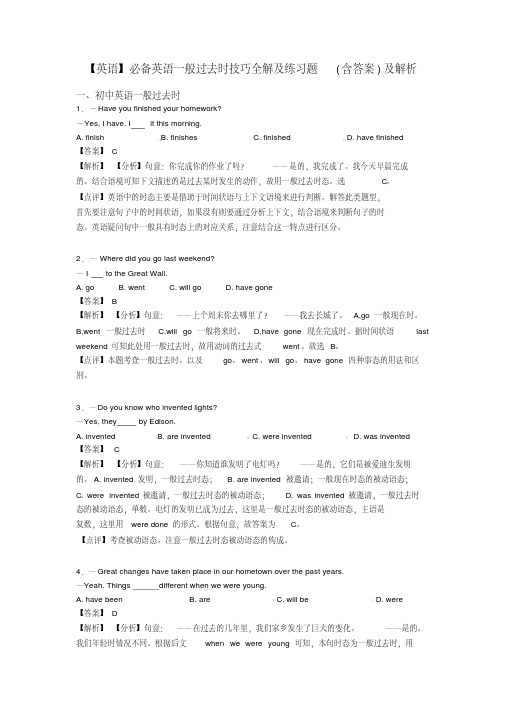
【英语】必备英语一般过去时技巧全解及练习题(含答案)及解析一、初中英语一般过去时1.-Have you finished your homework?-Yes, I have. I it this morning.A. finishB. finishesC. finishedD. have finished【答案】C【解析】【分析】句意:你完成你的作业了吗?——是的,我完成了。
我今天早晨完成的。
结合语境可知下文描述的是过去某时发生的动作,故用一般过去时态。
选C。
【点评】英语中的时态主要是借助于时间状语与上下文语境来进行判断。
解答此类题型,首先要注意句子中的时间状语,如果没有则要通过分析上下文,结合语境来判断句子的时态。
英语疑问句中一般具有时态上的对应关系,注意结合这一特点进行区分。
2.— Where did you go last weekend?— I to the Great Wall.A. goB. wentC. will goD. have gone【答案】B【解析】【分析】句意:——上个周末你去哪里了?——我去长城了。
A,go一般现在时。
B,went一般过去时C,will go一般将来时。
D,have gone现在完成时。
据时间状语last weekend可知此处用一般过去时,故用动词的过去式went。
故选B。
【点评】本题考查一般过去时。
以及go、went、will go、have gone四种事态的用法和区别。
3.—Do you know who invented lights?—Yes, they by Edison.A. inventedB. are inventedC. were inventedD. was invented【答案】 C【解析】【分析】句意:——你知道谁发明了电灯吗?——是的,它们是被爱迪生发明的。
A. invented发明,一般过去时态; B. are invented被邀请;一般现在时态的被动语态;C. were invented被邀请,一般过去时态的被动语态;D. was invented被邀请,一般过去时态的被动语态,单数。
(完整版word)英语一般过去时中考真题 含答案

(完整版word)英语一般过去时中考真题含答案一、初中英语一般过去时1.My mind wasn't on what he was saying so I'm afraid I ____________ half of it.A. missedB. was missingC. will missD. would miss【答案】A【解析】【分析】句意:本题翻译为:我的心思不在他刚才所说的内容上,所以我担心我刚才错过了一半的内容。
A. missed一般过去时;B. was missing过去进行时C. will miss一般将来时;D. would miss过去将来时。
根据句意,可知表示过去错过了一半的内容,所以用一般过去时,故选A。
【点评】此题考查一般过去时的用法。
2.By the time I ________ on the TV, Beckham ________ two goals.A. turned; have scoredB. turned; had scoredC. had turned; have scoredD. had turned; had scored【答案】 B【解析】【分析】句意:当我打开电视的时候,贝克汉姆已经进了两个球。
本句是时间状语从句,by the time到…时候为止,用于一般过去时,可排除CD选项。
从句用一般过去时,主句用过去完成时,需用“had+过去分词”结构,可排除A;根据句意结构,可知,故选B。
【点评】考查动词时态辨析题。
3.-Have you finished your homework?-Yes, I have. I it this morning.A. finishB. finishesC. finishedD. have finished【答案】C【解析】【分析】句意:你完成你的作业了吗?——是的,我完成了。
我今天早晨完成的。
结合语境可知下文描述的是过去某时发生的动作,故用一般过去时态。
(英语) 中考英语一般过去时专题训练答案含解析
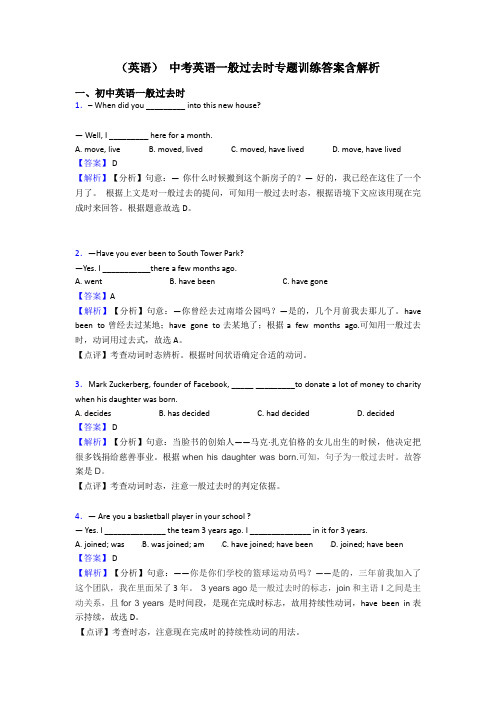
(英语)中考英语一般过去时专题训练答案含解析一、初中英语一般过去时1.– When did you _________ into this new house?— Well, I _________ here for a month.A. move, liveB. moved, livedC. moved, have livedD. move, have lived【答案】 D【解析】【分析】句意:—你什么时候搬到这个新房子的?—好的,我已经在这住了一个月了。
根据上文是对一般过去的提问,可知用一般过去时态,根据语境下文应该用现在完成时来回答。
根据题意故选D。
2.—Have you ever been to South Tower Park?—Yes. I ___________there a few months ago.A. wentB. have beenC. have gone【答案】A【解析】【分析】句意:—你曾经去过南塔公园吗?—是的,几个月前我去那儿了。
have been to曾经去过某地;have gone to去某地了;根据a few months ago.可知用一般过去时,动词用过去式,故选A。
【点评】考查动词时态辨析。
根据时间状语确定合适的动词。
3.Mark Zuckerberg, founder of Facebook, _____ _________to donate a lot of money to charity when his daughter was born.A. decidesB. has decidedC. had decidedD. decided【答案】 D【解析】【分析】句意:当脸书的创始人——马克·扎克伯格的女儿出生的时候,他决定把很多钱捐给慈善事业。
根据when his daughter was born.可知,句子为一般过去时。
故答案是D。
(英语)中考英语一般过去时答题技巧及练习题(含答案)
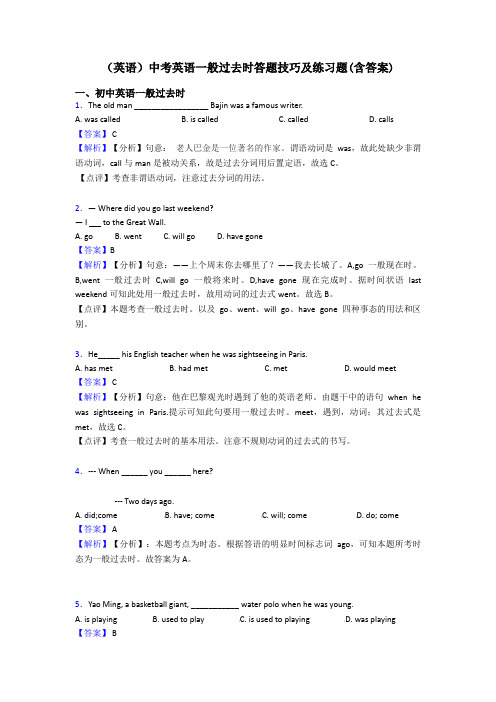
(英语)中考英语一般过去时答题技巧及练习题(含答案)一、初中英语一般过去时1.The old man _________________ Bajin was a famous writer.A. was calledB. is calledC. calledD. calls【答案】 C【解析】【分析】句意:老人巴金是一位著名的作家。
谓语动词是was,故此处缺少非谓语动词,call与man是被动关系,故是过去分词用后置定语,故选C。
【点评】考查非谓语动词,注意过去分词的用法。
2.— Where did you go last weekend?— I to the Great Wall.A. goB. wentC. will goD. have gone【答案】B【解析】【分析】句意:——上个周末你去哪里了?——我去长城了。
A,go一般现在时。
B,went一般过去时C,will go一般将来时。
D,have gone现在完成时。
据时间状语last weekend可知此处用一般过去时,故用动词的过去式went。
故选B。
【点评】本题考查一般过去时。
以及go、went、will go、have gone四种事态的用法和区别。
3.He_____ his English teacher when he was sightseeing in Paris.A. has metB. had metC. metD. would meet【答案】 C【解析】【分析】句意:他在巴黎观光时遇到了他的英语老师。
由题干中的语句when he was sightseeing in Paris.提示可知此句要用一般过去时。
meet,遇到,动词;其过去式是met,故选C。
【点评】考查一般过去时的基本用法。
注意不规则动词的过去式的书写。
4.--- When ______ you ______ here?--- Two days ago.A. did;comeB. have; comeC. will; comeD. do; come【答案】 A【解析】【分析】:本题考点为时态。
人教版中考英语中考英语总复习 一般过去时技巧全解及练习题(含答案)

人教版中考英语中考英语总复习必备英语一般过去时技巧全解及练习题(含答案)一、初中英语一般过去时1.–The radio says there will be a heavy storm in Mount Emei tomorrow. –Bad luck. I _________ to go there with my classmates.A. planB. will planC. planned【答案】 C【解析】【分析】句意:一电台说,明天峨眉山有暴雨。
一真倒霉,我计划和同学们去那儿。
A. plan一般现在时态; B. will plan 一般将来时态;C. planned一般过去时态。
说话时,已有计划,表示过去发生的动作,用一般过去时态。
动词用过去式,故选C。
2.The traffic was heavy this morning, but Dad________ to get to the office on time.A. managesB. managedC. would manageD. will manage【答案】 B【解析】【分析】句意:今天早上交通非常繁忙,但爸爸设法按时赶到了办公室。
根据The traffic was heavy this morning.可知,本句时态为一般过去时,动词“设法”manage的过去式为managed。
故选B。
【点评】考查一般过去时,注意判断句子的时态,选择正确答案。
3.—Have you ever been to South Tower Park?—Yes. I ___________there a few months ago.A. wentB. have beenC. have gone【答案】A【解析】【分析】句意:—你曾经去过南塔公园吗?—是的,几个月前我去那儿了。
have been to曾经去过某地;have gone to去某地了;根据a few months ago.可知用一般过去时,动词用过去式,故选A。
(英语)必备英语一般过去时技巧全解及练习题(含答案)及解析

(英语)必备英语一般过去时技巧全解及练习题(含答案)及解析一、初中英语一般过去时1.They don't live here any longer. They _______ to Chengdu last month.A. moveB. movedC. will moveD. are moving【答案】B【解析】【分析】句意:他们不再住在这里了。
他们上个月搬到成都了。
last month是一般过去时的时间状语,动词用过去式,故答案选B。
【点评】考查一般过去时态。
2.—My car ________ yesterday. Could you please give me a ride tomorrow?—I'm sorry I can't, I'm ________ Dalian tomorrow morning.A. breaks down; flying atB. has broken down; flying atC. broke down; flying toD. had broken down; flying to【答案】 C【解析】【分析】句意:——我的车坏了,你明天能搭我一程吗?——对不起我不能,我明天早上要坐飞机去大连。
break down,出毛病,出故障,根据yesterday,可知用一般过去时,break的过去式是broke,根据tomorrow morning,可知用一般将来时,一些表示移动的动词可以用be+doing,表将来时,故选C。
【点评】考查动词的时态。
注意根据时间状语确定动词时态。
3.—Have you ever been to South Tower Park?—Yes. I ___________there a few months ago.A. wentB. have beenC. have gone【答案】A【解析】【分析】句意:—你曾经去过南塔公园吗?—是的,几个月前我去那儿了。
【英语】中考英语一般过去时解题技巧讲解及练习题(含答案)

【英语】中考英语一般过去时解题技巧讲解及练习题(含答案)一、初中英语一般过去时1.——Nobody but you _______ late for school this morning.——Sorry , I _______ to school when it began to rain heavily.A. was , wentB. were ,was goingC. was , was about to goD. is, am going【答案】C【解析】【分析】句意:除了你今天早上没人迟到了。
对不起,我即将上学的时候,天开始下起了大雨。
Be about to do sth即将做某事,所以选C。
【点评】考查主谓一致。
2.In February, Chinese tech company Huawei ________ Mate X, a foldable (可折叠的) 5G mobile phone.A. is introducingB. introducedC. introducesD. was introduced【答案】 B【解析】【分析】句意:二月,中国科技公司华为介绍Mate X,一款可折叠5G手机。
根据In February,可知陈述过去的事情,用一般过去时,谓语动词用过去式,introduce介绍,其过去式是introduced,故选B。
【点评】考查动词的时态,注意句子涉及一般过去时。
3.--- When ______ you ______ here?--- Two days ago.A. did;comeB. have; comeC. will; comeD. do; come【答案】 A【解析】【分析】:本题考点为时态。
根据答语的明显时间标志词ago,可知本题所考时态为一般过去时。
故答案为A。
4.—Where did you go last winter vacation?—I ________ to London with my family.A. goB. have goneC. wentD. was going【答案】 C【解析】【分析】句意:——去年寒假你去哪里了?——我和家人去了伦敦。
(完整版)中考时态专题一般过去时详细讲解及练习
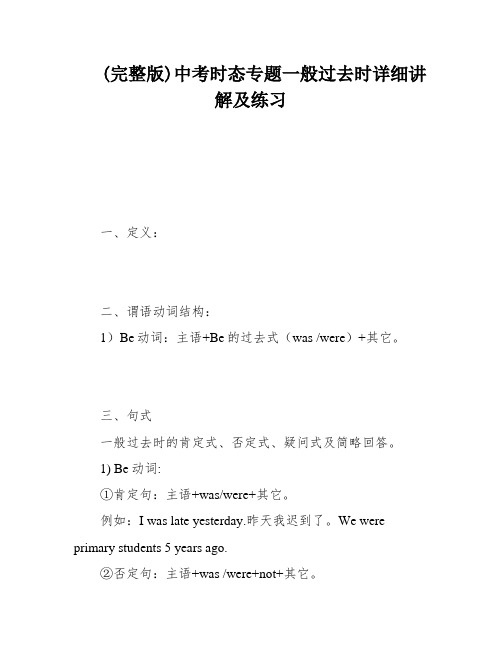
(完整版)中考时态专题一般过去时详细讲解及练习一、定义:二、谓语动词结构:1)Be动词:主语+Be的过去式(was /were)+其它。
三、句式一般过去时的肯定式、否定式、疑问式及简略回答。
1) Be动词:①肯定句:主语+was/were+其它。
例如:I was late yesterday.昨天我迟到了。
We were primary students 5 years ago.②否定句:主语+was /were+not+其它。
例如:___(我们昨天没迟到)③一般疑问句:be动词提前。
Was/Were+主语+其它?例如:I was ___(改一般疑问句) →Were you ill yesterday?(你昨天病了吗?)肯定回答:Yes, I was. (是的,我病了。
)否定回答:No, I wasn't. (不,我没病。
)④特殊疑问句:对谓语动词进行提问的:疑问词+was/were+主语+其它(一般疑问句)?2) 实义动词:①肯定句:主语+V-ed+其它。
例如:I called up my good friend just now.②否定句:主语+didn’t+V原形+其它。
例如:I didn’t argue with Tom last week.③一般疑问句:Did+主语+V原形+其它?例如:___ 2010. (改一般疑问句) →Did you buy a souvenir in 2010?肯定回答:Yes, I did.否定回答:No, I didn’t.④特殊疑问句:疑问词+did+主语+V原形+其它?例如:When did you buy the book?(你是什么时候买的这本书?)Finally, let's fill in the blanks with the correct form of the verb. "Was" should be used for the first blank, "played" for the second, "went" for the third, and "read" for the fourth.5. Tom was upset because he had failed the English test again.6. We moved to Beijing 8 years ago.1. C2. C3. B4. A5. C6. A7. B8. ATom was ___ down because he had failed his English test once again. It had e a recurring problem for him. Eight years ago,my family and I relocated to Beijing. This morning, I asked my friend what time she had arrived at school.1. What did they have for breakfast last week?2. ___?3. Jim ___ she was ___.4. They were not late the day before yesterday.5. Where did you go?6. Did Wei Fang have a good time last summer n? Yes, she did. / No, she didn't.7. Li Hong did not do her ___.8. How did Mr Gao go to work last year?9. Is there tea in the cup?1. Did Wei Fang have a good time last summer n? Yes, she did. / No, she didn't.2. Li Hong did not do her ___.3. How did Mr Gao go to work last year?4. Is there tea in the cup?。
中考英语语法真题:一般过去时 附解析2

《一般过去时》中考历年真题解析1.— What did you do last night?— I ________ my homework and watched TV.A.did B.do C.am doing D.will do中考真题解析:—昨天晚上你做了什么?—我做了我的作业,还看了电视。
由last night可知此句为一般过去时,故选A。
2.—I know you ______ to China many years ago. And how long have you ______ in China ?—I don't remember it exactly.A.come, live B.came; come C.come; come D.came; lived中考真题解析:—我知道你多年前就来中国了。
你在中国住了多久了?—我记不太清了。
根据过去时间短语many years ago可知,谓语动词使用过去式came。
how long与持续性动词连用,live是持续性动词,come暂时性动词。
根据语境可知,本句为现在完成时态,所以动词使用过去分词lived。
故选:D。
3.Sometimes Tina to school by bus last year.A.goes B.was going C.went D.has gone中考真题解析:去年缇娜有时候坐公交车去上学。
根据last year,可知句子是一般过去时,go的过去式是went,故答案是C。
4.—Hi, Jack. Nice to meet you here in Taizhou! —Me too. But I _______ you were in Shanghai.A.think B.thoughtC.am thinking D.will think中考真题解析:一你好,杰克,很高兴在泰州这儿见到你。
一我也是。
但是我以为你在上海。
(英语)中考英语一般过去时练习题及答案含解析

(英语)中考英语一般过去时练习题及答案含解析一、初中英语一般过去时1.–The radio says there will be a heavy storm in Mount Emei tomorrow. –Bad luck. I _________ to go there with my classmates.A. planB. will planC. planned【答案】 C【解析】【分析】句意:一电台说,明天峨眉山有暴雨。
一真倒霉,我计划和同学们去那儿。
A. plan一般现在时态; B. will plan 一般将来时态;C. planned一般过去时态。
说话时,已有计划,表示过去发生的动作,用一般过去时态。
动词用过去式,故选C。
2.— Where did you go last weekend?— I to the Great Wall.A. goB. wentC. will goD. have gone【答案】B【解析】【分析】句意:——上个周末你去哪里了?——我去长城了。
A,go一般现在时。
B,went一般过去时C,will go一般将来时。
D,have gone现在完成时。
据时间状语last weekend可知此处用一般过去时,故用动词的过去式went。
故选B。
【点评】本题考查一般过去时。
以及go、went、will go、have gone四种事态的用法和区别。
3.—Have you ever been to South Tower Park?—Yes. I ___________there a few months ago.A. wentB. have beenC. have gone【答案】A【解析】【分析】句意:—你曾经去过南塔公园吗?—是的,几个月前我去那儿了。
have been to曾经去过某地;have gone to去某地了;根据a few months ago.可知用一般过去时,动词用过去式,故选A。
(英语)中考必备英语一般过去时技巧全解及练习题(含答案)
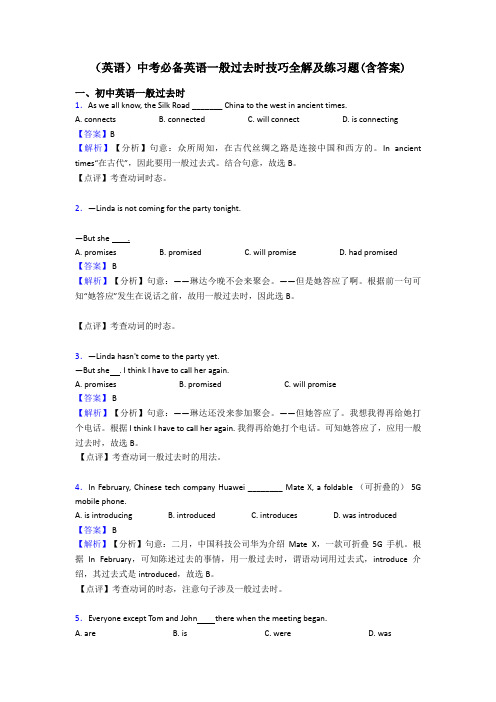
(英语)中考必备英语一般过去时技巧全解及练习题(含答案)一、初中英语一般过去时1.As we all know, the Silk Road _______ China to the west in ancient times.A. connectsB. connectedC. will connectD. is connecting【答案】B【解析】【分析】句意:众所周知,在古代丝绸之路是连接中国和西方的。
In ancient times“在古代”,因此要用一般过去式。
结合句意,故选B。
【点评】考查动词时态。
2.—Linda is not coming for the party tonight.—But she _.A. promisesB. promisedC. will promiseD. had promised【答案】 B【解析】【分析】句意:——琳达今晚不会来聚会。
——但是她答应了啊。
根据前一句可知“她答应”发生在说话之前,故用一般过去时,因此选B。
【点评】考查动词的时态。
3.—Linda hasn't come to the party yet.—But she . I think I have to call her again.A. promisesB. promisedC. will promise【答案】 B【解析】【分析】句意:——琳达还没来参加聚会。
——但她答应了。
我想我得再给她打个电话。
根据 I think I have to call her again. 我得再给她打个电话。
可知她答应了,应用一般过去时,故选B。
【点评】考查动词一般过去时的用法。
4.In February, Chinese tech company Huawei ________ Mate X, a foldable (可折叠的) 5G mobile phone.A. is introducingB. introducedC. introducesD. was introduced【答案】 B【解析】【分析】句意:二月,中国科技公司华为介绍Mate X,一款可折叠5G手机。
中考英语时态全解之一般过去时(附中考真题点拨习题以及答案)
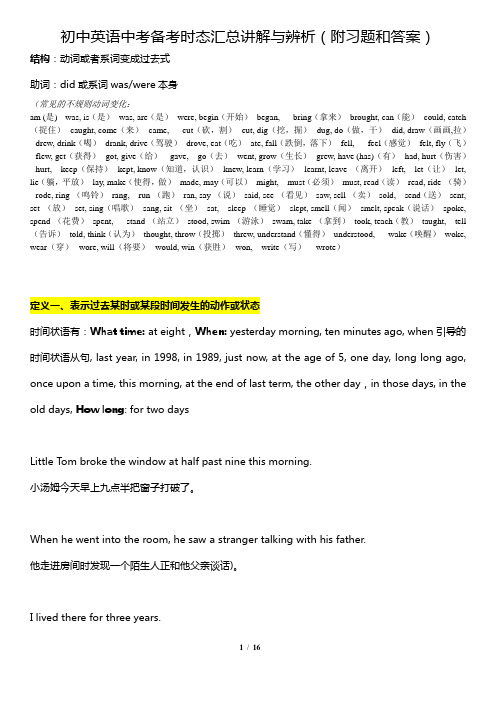
初中英语中考备考时态汇总讲解与辨析(附习题和答案)结构:动词或者系词变成过去式助词:did或系词was/were本身(常见的不规则动词变化:am (是) --was, is(是)--was, are(是)--were, begin(开始)--began, bring(拿来)--brought, can(能)--could, catch (捉住)--caught, come(来)--came, cut(砍,割)--cut, dig(挖,掘)--dug, do(做,干)--did, draw(画画,拉)--drew, drink(喝)--drank, drive(驾驶)--drove, eat(吃)--ate, fall(跌倒,落下)--fell, feel(感觉)--felt, fly(飞)--flew, get(获得)--got, give(给)---gave, go(去)--went, grow(生长)--grew, have (has)(有)--had, hurt(伤害)--hurt, keep(保持)--kept, know(知道,认识)--knew, learn(学习)--learnt, leave (离开)--left, let(让)--let, lie(躺,平放)--lay, make(使得,做)--made, may(可以)--might, must(必须)--must, read(读)--read, ride (骑)--rode, ring (鸣铃)--rang, run (跑)--ran, say (说)--said, see (看见)--saw, sell (卖)--sold, send(送)--sent, set (放)--set, sing(唱歌)--sang, sit (坐)--sat, sleep (睡觉)--slept, smell(闻)--smelt, speak(说话)--spoke, spend (花费)--spent, stand (站立)--stood, swim (游泳)--swam, take (拿到)--took, teach(教)--taught, tell (告诉)--told, think(认为)--thought, throw(投掷)--threw, understand(懂得)--understood, wake(唤醒)--woke, wear(穿)--wore, will(将要)--would, win(获胜)--won, write(写)--wrote)定义一、表示过去某时或某段时间发生的动作或状态时间状语有:What time: at eight,When: yesterday morning, ten minutes ago, when引导的时间状语从句, last year, in 1998, in 1989, just now, at the age of 5, one day, long long ago, once upon a time, this morning, at the end of last term, the other day,in those days, in the old days, How long: for two daysLittle Tom broke the window at half past nine this morning.小汤姆今天早上九点半把窗子打破了。
- 1、下载文档前请自行甄别文档内容的完整性,平台不提供额外的编辑、内容补充、找答案等附加服务。
- 2、"仅部分预览"的文档,不可在线预览部分如存在完整性等问题,可反馈申请退款(可完整预览的文档不适用该条件!)。
- 3、如文档侵犯您的权益,请联系客服反馈,我们会尽快为您处理(人工客服工作时间:9:00-18:30)。
初中英语中考备考时态汇总讲解与辨析(附习题和答案)一般过去时结构:动词或者系词变成过去式助词:did或系词was/were本身(常见的不规则动词变化:am (是) --was, is(是)--was, are(是)--were, begin(开始)--began, bring(拿来)--brought, can(能)--could, catch (捉住)--caught, come(来)--came, cut(砍,割)--cut, dig(挖,掘)--dug, do(做,干)--did, draw(画画,拉)--drew, drink(喝)--drank, drive(驾驶)--drove, eat(吃)--ate, fall(跌倒,落下)--fell, feel(感觉)--felt, fly(飞)--flew, get(获得)--got, give(给)---gave, go(去)--went, grow(生长)--grew, have (has)(有)--had, hurt(伤害)--hurt, keep(保持)--kept, know(知道,认识)--knew, learn(学习)--learnt, leave (离开)--left, let(让)--let, lie(躺,平放)--lay, make(使得,做)--made, may(可以)--might, must(必须)--must, read(读)--read, ride (骑)--rode, ring (鸣铃)--rang, run (跑)--ran, say (说)--said, see (看见)--saw, sell (卖)--sold, send(送)--sent, set (放)--set, sing(唱歌)--sang, sit (坐)--sat, sleep (睡觉)--slept, smell(闻)--smelt, speak(说话)--spoke, spend (花费)--spent, stand (站立)--stood, swim (游泳)--swam, take (拿到)--took, teach(教)--taught, tell (告诉)--told, think(认为)--thought, throw(投掷)--threw, understand(懂得)--understood, wake (唤醒)--woke, wear(穿)--wore, will(将要)--would, win(获胜)--won, write(写)--wrote)使用系词时,用系词本身构成否定疑问等:结构:⑴am 和is在一般过去时中变为was。
⑵are在一般过去时中变为were。
.助词:系词本身肯定句:He was at home yesterday.否定句:H e wasn’t at home yesterday.一般疑问句:Was he at home yesterday Yes, he was. No, he wasn’t.特殊疑问句:Where was he yesterday选择疑问句:Was he at home or at work He was at home.使用动词时,用助词did进行否定疑问等,助词出现,动词变回原形:结构:动词变成过去式助词:did|肯定句:I watched a film last Sunday.否定句:I didn’t watch a film yesterday.一般疑问句:Did youwatch a film yesterday特殊疑问句:What did you do yesterday选择疑问句:Did you watch a movie or go shopping yesterdayI watched a movie.使用情态动词时,用情态动词的过去式:can变形could,may变成might, shall变成should,have to 变成had to,must没有变形。
情态动词后加动词原形。
He could play the piano at the age of four.在他四岁的时候他就会弹钢琴。
He had to walk home this evening.)他今天傍晚时不得不走回家。
定义一、表示过去某时或某段时间发生的动作或状态时间状语有:What time:at eight,When: yesterday morning, ten minutes ago, when引导的时间状语从句, last year, in 1998, in 1989, just now, at the age of 5, one day, long long ago, once upon a time, this morning, at the end of last term, the other day,in those days, in the old days,How long: for two daysLittle Tom broke the window at half past nine this morning.小汤姆今天早上九点半把窗子打破了。
When he went into the room, he saw a stranger talking with his father.—他走进房间时发现一个陌生人正和他父亲谈话)。
I lived there for three years.我住在那里三年。
注意:1. 说话双方都明白的过去事件经常省略时间状语。
How nice to see you here! I thought you were out.在这见到你真好啊。
我原以为你出去了。
)---Look at the sign,“No smoking!”--- Sorry, I didn’t see it.看标牌,“禁止吸烟!”对不起,我(刚才)没看到。
I happened to meet Rose in the street.我(刚才/过去某时)正好在街上遇到露西。
Lu Xun was a great writer.鲁迅是一个伟大的作家。
·What did you say你(刚才)说什么2.表过去是这样,现在完全改变了。
I used to be a teacher.我过去曾是一名教师。
表示现在已经不是教师了。
I used to talk a walk in the park.我过去常在这个公园散步。
言外之意,现在不这样做了。
、I was a teacher three years ago.三年前我是一名老师。
定义二、表过去经常性习惯性动作。
时间状语有:When: last…, in…, from…to…, for(10 years) How often:often, usually, sometimes, always, never等。
He usually went to evening schools when he was young.当他小的时候,他通常上夜校。
Every day he went to the rich man and borrowed books from him.…他(那时)每天都去那个富人那里并且从他借一些书。
定义三、用过去时形式表委婉语气,没有过去时的含义。
Could you lend me your pen你能把你的钢笔借给我吗Could you tell me where he lives你能告诉我他住在哪里吗(委婉形式,无过去时之意,从句不变成过去时。
)一般过去时和现在完成时的区别~1. 一般过去时的谓语动词用过去式,而现在完成时的谓语基本构成是“have/ has + 过去分词”。
2. 一般过去时通常与表示过去的时间状语连用。
如:yesterday, last week , two years ago ,just now ,in 2002 等;而现在完成时则常与just ,already ,ever ,never 等副词和these days ,this week ,since ......, for ...... 等表示一段时间的状语连用。
试比较以下几组句子:①Have you seen the filmDid you see the film第一句句强调的是被问者对剧情是否了解,即现在情况;第二句强调的是看这部电影的动作是否发生过,并不强调是否知道其内容。
②How has he done itHow did he do it第一句强调的是他做这件事的方式对现在产生了某种影响;第二句单纯的询问做这件事的方式。
(③He has lived in Beijing for 8 years .He lived in Beijing for 8 years.第一句讲的是到目前为止他在北京住了8 年,可能还会继续在北京住下去。
第二句讲的是他在北京住过8 年,现在已经不在北京了。
(2)现在完成时强调过去发生的动作对现在的影响和结果,而一般过去时与现在没有联系,只是说明某个动作发生的时间是在过去。
比:I have washed the car. 我洗过了车。
(看上去很漂亮)I washed the car a moment ago.我刚才洗过车了。
She has watered the flowers.她已经浇了花。
(不需要再浇了)She watered the flowers yesterday.她昨天浇的花。
(3)现在完成时表示的动作或状态延续到现在并可能延续下去,而一般过去时则单纯表示过去某段时间内的经历。
比:It has rained for five hours. 雨已经下了5个小时了。
—It rained for five hours yesterday.昨天下了5个小时的雨。
He has waited for her for two hours. 他等她已经两个小时了。
He waited for her two hours and then went home.他等她等了两个小时,然后就回家了。
I have reviewed two lessons this morning.今天上午我已经复习了两课。
(说话时还在上午)I reviewed two lessons this morning.今天上午我复习了两课。
(说话时已是下午或晚上)一般过去时和过去进行时的区别He was writing a letter last night.(我看见)他昨天晚上正在写信。
